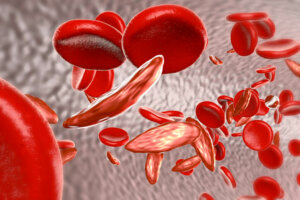Causes of Anemia

Besides iron deficiency, there are other causes of anemia. Depending on which one is diagnosed, symptoms and treatment will vary. This means that a person with iron deficiency anemia doesn’t require treatment with the same specifications as a person with anemia due to chronic diseases, for example.
You need to bear in mind that the term anemia is used globally to refer to several disorders.
Although they all share a common trait (low hemoglobin and erythrocyte count), the cause behind this low count can vary considerably, and may not only be the manifestation of a hematological disease but also of many other conditions.
Common causes

According to the experts at the University of Navarra Clinic, there are three main reasons why red blood cells can decrease:
- They aren’t produced in sufficient quantity.
- Iron deficiency
- Medullary aplasias
- Chronic diseases (such as rheumatic diseases and diseases associated with chronic kidney failure)
- Infiltration of the bone marrow by tumors
- The maturation of red blood cells doesn’t occur efficiently in the bone marrow.
- Folate deficiency
- Vitamin B12 deficiency
- They’re destroyed or lost at high speed.
- Bleeding
- Hereditary disorders (abnormalities of the red blood cell membrane or hemoglobin, such as sickle cell anemia).
- Hemolysis or intravascular rupture of red blood cells due to mechanical or autoimmune causes.
Here we’ll explain two of the most common: iron deficiency and megaloblastic anemia.
Iron deficiency anemia
Iron deficiency is one of the most common causes of anemia. This is usually the result of bleeding (menstruation, bleeding in the digestive tract, etc.). It’s characterized by tiredness, paleness, and weakness.
As stated in the MSD Manual: “it tends to develop slowly, because it can take many months for the body’s reserves to be used up.”
Megaloblastic anemia or folate deficiency anemia
Another cause of anemia is folate or folic acid deficiency. This type of anemia is also known as megaloblastic anemia. In turn, this can be caused by a poor diet, prolonged alcoholism, or the consumption of certain medications (such as barbiturates, for example).
Risk factors
There are several risk factors that can lead to anemia. Some of the most common are the following.
Bad nutrition
When you don’t maintain a proper diet, you’re more likely to develop anemia and other health problems. Especially when it involves a low intake of sources of iron, folates, and vitamins.
Chronic diseases

Diabetes, chronic kidney disease, ulcerative colitis, and rheumatoid arthritis are some of the chronic conditions that can lead to the development of anemia.
Bowel disorders
When there’s a disorder that makes it difficult for nutrients to be properly absorbed, such as celiac disease and Crohn’s disease, people can develop anemia.
Pregnancy
Pregnant women are at risk for iron deficiency anemia because their body requires more iron during this stage to supply oxygen to the baby. They’re also prone to folate deficiency anemia.
Menorrhagia (intense bleeding during menstruation)
Women of childbearing age are prone to iron deficiency anemia due to heavy bleeding during menstruation.
Other risk factors
- Age
- Cancer
- Bleeding
- Alcoholism
- Blood disorders
- Autoimmune diseases
- Family history [of anemia]
- Consumption of certain medications
When to see the doctor?
If you notice various discomforts and you suspect that something’s wrong with your health and that you could have anemia, it’s best to go to the doctor for a checkup as soon as possible.
The sooner you do it, the sooner you can receive a diagnosis and treatment according to your case. Avoid taking supplements (iron or others) without consulting with the doctor as it could be counterproductive.
Don’t overlook the condition, and always resolve all your questions with the professional. In addition, remember that it’s highly recommended that you improve your lifestyle habits to reduce the risk of any health problems worsening, and to prevent others. To know how to do it step by step, the doctor will give you the guidelines you need.
Besides iron deficiency, there are other causes of anemia. Depending on which one is diagnosed, symptoms and treatment will vary. This means that a person with iron deficiency anemia doesn’t require treatment with the same specifications as a person with anemia due to chronic diseases, for example.
You need to bear in mind that the term anemia is used globally to refer to several disorders.
Although they all share a common trait (low hemoglobin and erythrocyte count), the cause behind this low count can vary considerably, and may not only be the manifestation of a hematological disease but also of many other conditions.
Common causes

According to the experts at the University of Navarra Clinic, there are three main reasons why red blood cells can decrease:
- They aren’t produced in sufficient quantity.
- Iron deficiency
- Medullary aplasias
- Chronic diseases (such as rheumatic diseases and diseases associated with chronic kidney failure)
- Infiltration of the bone marrow by tumors
- The maturation of red blood cells doesn’t occur efficiently in the bone marrow.
- Folate deficiency
- Vitamin B12 deficiency
- They’re destroyed or lost at high speed.
- Bleeding
- Hereditary disorders (abnormalities of the red blood cell membrane or hemoglobin, such as sickle cell anemia).
- Hemolysis or intravascular rupture of red blood cells due to mechanical or autoimmune causes.
Here we’ll explain two of the most common: iron deficiency and megaloblastic anemia.
Iron deficiency anemia
Iron deficiency is one of the most common causes of anemia. This is usually the result of bleeding (menstruation, bleeding in the digestive tract, etc.). It’s characterized by tiredness, paleness, and weakness.
As stated in the MSD Manual: “it tends to develop slowly, because it can take many months for the body’s reserves to be used up.”
Megaloblastic anemia or folate deficiency anemia
Another cause of anemia is folate or folic acid deficiency. This type of anemia is also known as megaloblastic anemia. In turn, this can be caused by a poor diet, prolonged alcoholism, or the consumption of certain medications (such as barbiturates, for example).
Risk factors
There are several risk factors that can lead to anemia. Some of the most common are the following.
Bad nutrition
When you don’t maintain a proper diet, you’re more likely to develop anemia and other health problems. Especially when it involves a low intake of sources of iron, folates, and vitamins.
Chronic diseases

Diabetes, chronic kidney disease, ulcerative colitis, and rheumatoid arthritis are some of the chronic conditions that can lead to the development of anemia.
Bowel disorders
When there’s a disorder that makes it difficult for nutrients to be properly absorbed, such as celiac disease and Crohn’s disease, people can develop anemia.
Pregnancy
Pregnant women are at risk for iron deficiency anemia because their body requires more iron during this stage to supply oxygen to the baby. They’re also prone to folate deficiency anemia.
Menorrhagia (intense bleeding during menstruation)
Women of childbearing age are prone to iron deficiency anemia due to heavy bleeding during menstruation.
Other risk factors
- Age
- Cancer
- Bleeding
- Alcoholism
- Blood disorders
- Autoimmune diseases
- Family history [of anemia]
- Consumption of certain medications
When to see the doctor?
If you notice various discomforts and you suspect that something’s wrong with your health and that you could have anemia, it’s best to go to the doctor for a checkup as soon as possible.
The sooner you do it, the sooner you can receive a diagnosis and treatment according to your case. Avoid taking supplements (iron or others) without consulting with the doctor as it could be counterproductive.
Don’t overlook the condition, and always resolve all your questions with the professional. In addition, remember that it’s highly recommended that you improve your lifestyle habits to reduce the risk of any health problems worsening, and to prevent others. To know how to do it step by step, the doctor will give you the guidelines you need.
-
“Anemia – Síntomas y Causas – Mayo Clinic.” n.d. Accessed May 26, 2021. https://www.mayoclinic.org/es-es/diseases-conditions/anemia/symptoms-causes/syc-20351360.
-
“Anemia: Tipos, Síntomas, Causas y Tratamientos. Clínica Universidad de Navarra.” n.d. Clínica Universidad de Navarra. Accessed May 27, 2021. https://www.cun.es/enfermedades-tratamientos/enfermedades/anemia.
-
“Anemia Por Deficiencia de Folato: MedlinePlus Enciclopedia Médica.” n.d. Accessed May 27, 2021. https://medlineplus.gov/spanish/ency/article/000551.htm.
-
“Anemia Por Falta de Hierro – Trastornos de La Sangre – Manual MSD Versión Para Público General.” n.d. Accessed May 27, 2021. https://www.msdmanuals.com/es/hogar/trastornos-de-la-sangre/anemia/anemia-por-falta-de-hierro.
-
Espitia De La Hoz F, Orozco l. 2013. “Anemia En El Embarazo, Un Problema de Salud Que Puede Prevenirse.” Revista de Los Estudiantes de Medicina de La Universidad Industrial de Santander, 2013. http://www.scielo.org.co/pdf/muis/v26n3/v26n3a05.pdf.
-
NIH Publication. 2011. “Anemia Guía Breve Sobre La Anemia.” No. 11-7629AS. https://www.nhlbi.nih.gov/files/docs/public/blood/anemia-inbrief_yg_sp.pdf.
-
Various. n.d. “Anemias COORDINADORES.” Accessed May 26, 2021. http://sah.org.ar/docs/1-78-SAH_GUIA2012_Anemia.pdf.
Este texto se ofrece únicamente con propósitos informativos y no reemplaza la consulta con un profesional. Ante dudas, consulta a tu especialista.







